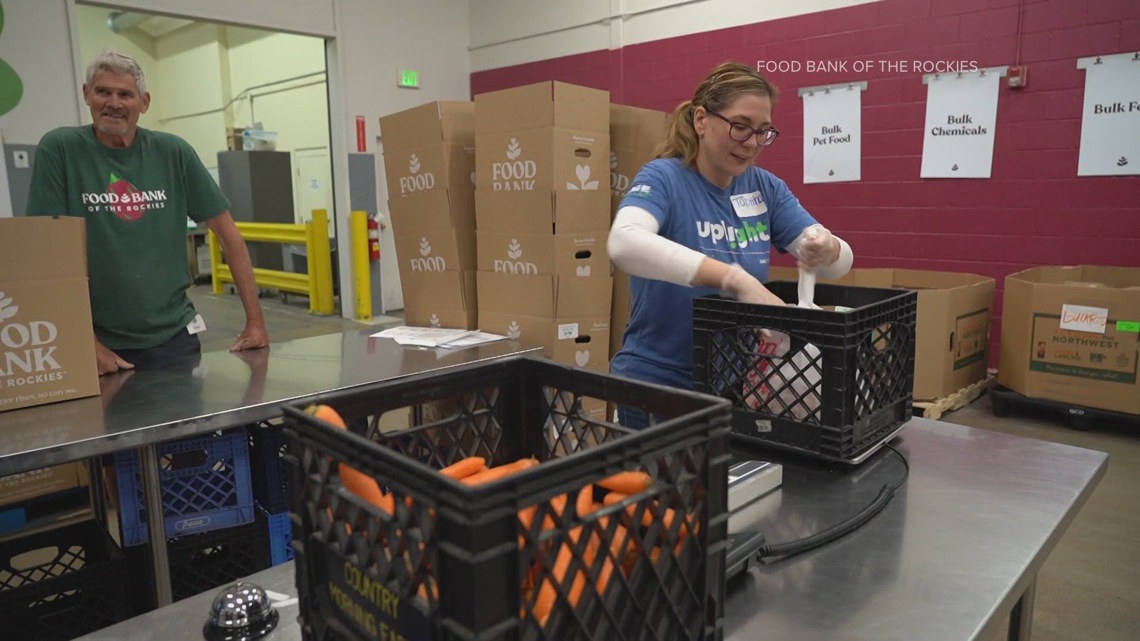
Food insecurity can often lead to health issues and diseases. For many, access to fresh, healthy food is not in the budget, but a new program aims to help.
DENVER — For years, we’ve known food insecurity goes hand in hand with health issues and diseases. But for many, access to fresh produce, whole grains and proteins are just not in the budget.
Food Bank of the Rockies has a program that’s helping change that, called Food for Health.
By partnering with healthcare organizations in the Colorado, they’re helping identify people dealing with health challenges who are having a hard time accessing the right foods. Once they’re matched, Food Bank of the Rockies brings healthy foods directly to people in the program.
And it’s already making a difference. There’s one delivery Sherri King is always happy to see on her front steps.
“I look forward to it every Thursday!” King said.
King is a Food for Health program recipient.
“I open it like a Christmas present! It’s Christmas every Thursday,” she said.
The contents are always different and always nourishing.
“Last time we got potatoes, a lot of canned stuff, lemons. What else did we get over there? We got a baby watermelon!” King said. “It’s just, you know, food that everybody needs.”
The foods now showing up at her door weekly are ones she wasn’t always getting in her diet before.
“Sometimes groceries are not in my budget because you’ve got rent, you’ve got phone, you got all these other bills. And food? Food is last,” King said.
That’s a conversation that came up a few months back when she was in the hospital with kidney stones.
“I was talking to the nurse about food and how I’m having a hard time eating because of past things that have happened. And she goes, ‘Well, let’s try Food Bank of the Rockies,’” King said.
“This diet is critical to support our neighbors,” said Monica Buhlig, chief impact officer with Food Bank of the Rockies.
King is one of many around Colorado enrolled in their Food for Health program. Buhlig said connecting people with health issues with healthy foods that can help.
“Food security has been identified as one of those contributors to good health and the lack of food security is a contributor to poor health,” Buhlig said.
According to the CDC, adults experiencing food insecurity are two to three times more likely to have Type 2 diabetes. They’re also more likely to have cardiovascular disease and more likely to die from it.
Buhlig said this program aims to turn those health outcomes around.
“Food is medicine and that’s important to recognize,” Buhlig said.
So far, it’s working. Through weekly deliveries filled with proteins, whole grains and produce, Buhlig says those in the program have all reported either maintaining or improving their health.
King said she notices the difference already.
“Well, I eat better. I feel better,” King said.
In the first few months of the program, King says the deliveries are improving her health with groceries she looks forward to.
“Pineapple. Everybody loves pineapples,” she said while unpacking her latest delivery.
The program is offering her a helping hand that she hopes to hold on to.
“As long as they’ll let me,” King said.
The Food for Health program started about two years ago and it’s been growing since. They recently expanded it over to the Western Slope. The boxes delivered each week are crafted by dieticians with enough food inside for about 10 meals.
How does it work? Their partnered healthcare organizations identify patients experiencing chronic health challenges and food insecurity and match them with the program. That work starts at your doctor’s office.
According to Food Bank of the Rockies, they’re currently partnered with Platte Valley Medical Center, Lutheran Medical Center, Denver Indian Health and Family Services, Denver Health and Common Spirit St. Anthony North.
If you or someone you know is experiencing food insecurity, you can get food and assistance quickly from any of Food Bank of the Rockies’ 600 providers. For more information on how you can help or to find food near you, visit their website.
